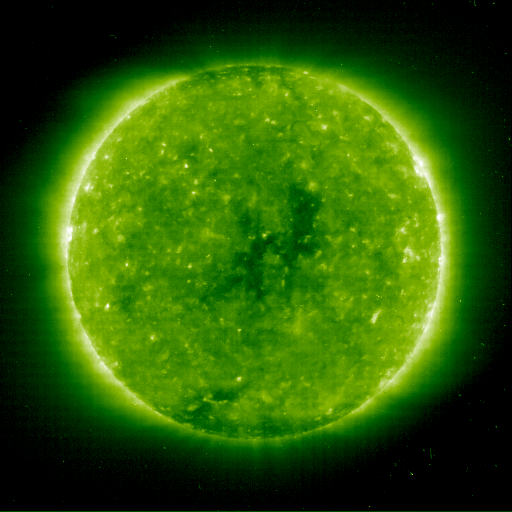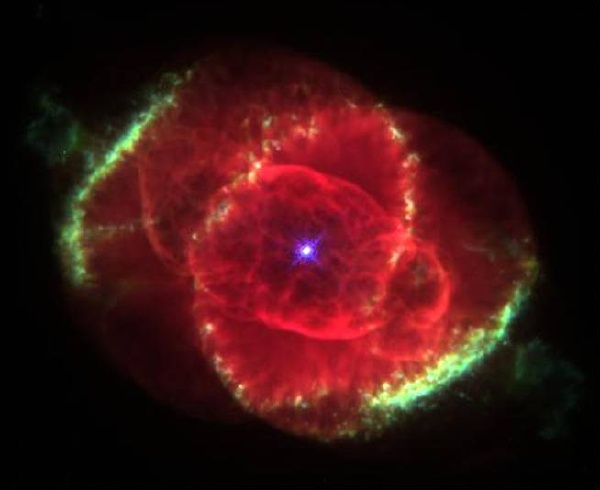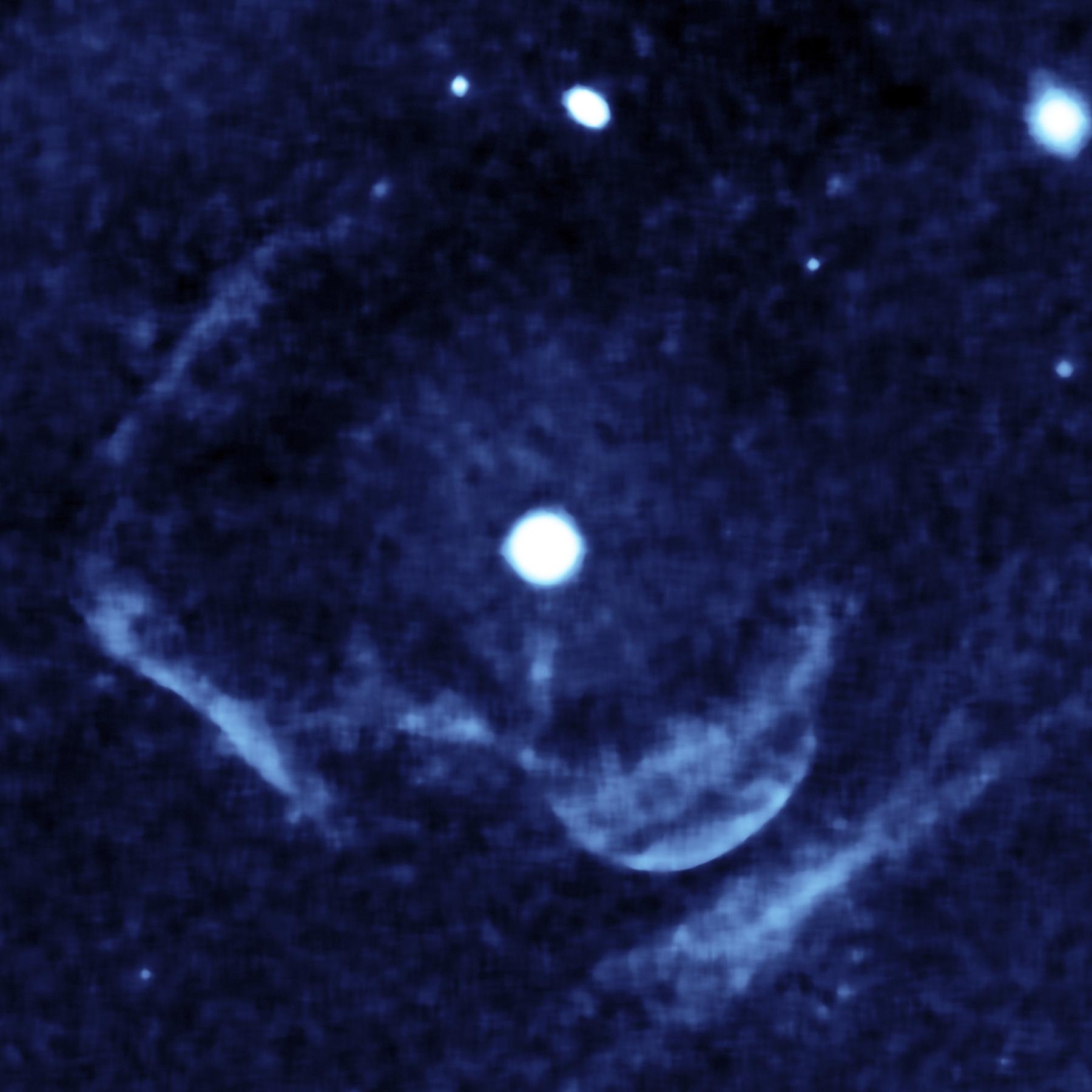Astronomy 122: Birth, Life, and Death of Stars
Astronomy 122 is a science group satisfying course (>3),
part of an introduction to the science of astronomy for non-science majors
with an emphasis on the structure and evolution of stsrs. Our star, the Sun, is the closest star to the
Earth and thus the most intensely studied. The Sun thus serves as a paradigm for normal stars in our
galaxy, the Milky Way, and beyond. Furthermore, the Sun is directly or indirectly the source of all the
energy necessary to sustain life on our world. Astronomy 122
describes the birth, evolution and death of
stars in the Milky Way galaxy, with a particular emphasis on the underlying science behind stellar and
galactic evolution, the observational aspect to astronomy and our knowledge of how the Universe
operates on the stellar scale.
The goals of Astronomy 122 are: 1) give students an introduction to the
basic forces of nature and the structure of matter;
2) give students an understanding of the science and techniques that
underlie modern observational astronomy;
and 3) help students develop an understanding of the tools used by astronomers
when problem solving, skills relating to unraveling
the mathematics, physics and chemistry of stars.
In addition, Astronomy 122 traces the history of
our developing knowledge of stars
in order to explore how the scientific method works and
how civilization has gained from the
progress of science and technology. The interplay between technology
(telescopes, space
observatories) and knowledge gained about
the stars is a key theme to the course
|
|



Left: SOHO image of Sun, Middle: Helix Nebula, Right: Z Cha |
ASTRONOMY PICTURE OF THE DAY
Sky and Telescope
Astronomy
Space.com
Scientific American News
Science News
Instructor: James N. Imamura
Office: 457 Willamette Hall
E-mail: imamura@uoregon.edu
Phone: 541-346-5212
Office Hours: 10:00-noon Tu, noon-14:00 Th, or by appointment (in-person or Zoom) in 457 Willamette Hall
Course: ASTR 122: Birth, Life and Death of Stars;
ASTR 122 is a science group course (>3)
Course CRN: 20803
Text: Cosmic Perspective, 10th edition, Bennett, Donahue, Schneider & Voit
Class: 14:00-14:50, MWF
Room: 100 Willamette Hall
|
|
 |
Scoring:
Tentative Grading Scale:*
SEE ANNOUNCEMENTS ON CANVAS FOR REVISED GRADING SCALE
- A greater than or equal to 85 %
- A- greater than or equal to 80 %
- B+ greater than or equal to 76 %
- B greater than or equal to 73 %
- B- greater than or equal to 70 %
- C+ greater than or equal to 65 %
- C greater than or equal to 60 %
- C- greater than or equal to 55 %
- D+ greater than or equal to 52 %
- D greater than or equal to 48 %
- D- greater than or equal to 45 %
- F less than 45 %
- P greater than or equal to 55 %
- NP less than 55 %
*
The final course grading scale may change slightly based
on the class performance.
The final grading scale will, however, be no higher than that
given above.
Tests:
Test 1: Friday, January 26, 2024
Test 2: Monday, February 12, 2024
Test 3: Friday, March 1, 2024
Test 4: Thursday, March 21, 2024 at 14:45 in 100 Willamette Hall
The course is divided into 4 parts. Each test covers material
primarily taken from one section of the course. The last test,
Test 4, will not be cumulative. The format for the tests will be
weighted roughly as 50 % multiple choice questions and 50 % short
answer questions.
Homework Assignments:
HW 1: due by the end of Friday, January 26, 2024,
Wolf Numbers (.pdf),
Wolf Numbers (.pptx)
HW 2: due by the end of Monday, February 12,2024,
Hertzsprung-Russell Diagram (.pdf),
Hertzsprung-Russell Diagram (.pptx)
HW 3: due by the end of Friday, March 1, 2024,
Cepheids (.pdf)
HW 4: due by the end of Friday, March 15, 2024,
Supernovae and Earth (.pdf)
Late assignments will be accepted after the assignment's posted
due date. Late assignments will lose 1
point for each day late.
Academic Deadlines:
Last day to adjust registration without recorded W January 13
Last day to register/add classes online January 15
Martin Luther King, Jr. holiday January 15
Last day to withdraw from classes February 25
Last day for grade option changes February 25
Last day of Dead Week
March 15
Ref: link for complete set and descriptions of academic deaslines for
2024
Academic Deadlines
Course Schedule:
Topic | Material
| Reading Topics |
Date |
Notes |
1 | Why Do We Study Stars?
Chapters 14 (sections 14.2,14.3), S3 (S3.4) |
2024 Jan 8,10,12 | |
|
2 | How Do We Study Stars?
Chapter 6 (sections 6.3,6.4) |
2024 Jan 17 |
|
|
3 | Properties of Stars |
Chapters 4,5,15.1 |
2024 Jan 19,22,24 |
|
| Test 1: 2024 January 26 |
|
|
|
4 | Spectral Analysis: Lines and MK Spectral
Classification |
Chapter 4,15.1 |
2024 Jan 29,31 |
|
5 | Tying Things Together: H-R
Diagram, Mass-Luminosity Relation, ...
|
Chapter 15.2,15.3 |
2024 Feb 2,5 | |
6 | The Sun: Our Star
|
Chapter 14 |
2024 Feb 7,9 | |
| Test 2: 2024 February 12
|
|
|
|
6 | The Sun: Our Star
|
Chapter 14 |
2024 Feb 14 | |
7 |
Star Formation |
Chapter 16 |
2024 Feb 16,19 | |
8 |
Evolution of Low and Intermediate Mass Stars |
Chapters 17,18,15.3 |
2024 Feb 21,23 | |
9 |
Evolution of High Mass Stars |
Chapters 17,18,15.3 |
2024 Feb 26,28 | |
|
Test 3: 2024 March 1 |
|
|
|
10 |
Exploding Stars: Type I and Type II Supernovas |
Chapters 17,18, and 22 |
2024 Mar 4,6,8,11,13,15 | |
11 |
Black Holes, Gravitational Waves, and LIGO |
Chapters 18, and S2,S3 |
.... | |
|
Test 4: 2024 March 21, 14:45 |
|
|
|
University Policy Guidelines
Accessible Education
Please let me know within the first two weeks of the term if you need
assistance to fully participate in the course. Participation includes access
to lectures, web-based information, in-class activities, and exams. The
Accessible Education Center (http://aec.uoregon.edu/) works with students to
provide an instructor notification letter that outlines accommodations and
adjustments to class design that will enable better access.
You are encouraged to contact the Accessible Education Center in 360 Oregon
Hall at 541-346-1155 or
uoaec@uoregon.edu for assistance with access or disability-related
questions or concerns.
Attendance when Ill or Symptomatic
Students who are ill or have symptoms
should be held harmless in attendance policies.
- Students should not attend class if they are ill, have
symptoms, and, or are quarantining.
We do not want students attending class when they
should not be because
they fear their grade will be affected.
- Absent students have
access to course content through the course website as may
be accessed through CANVAS.
Frequent absences and lack of availability for make-ups may jeopardize a
student's chance for success in the course. In the case of frequent absences
or lack of availability for make-ups or in-class exercises, the affected
student must communicate with the instructor as
early as possible.
Instructors will provide make-ups for exams under appropriate circumstances.
In cases where
students are missing only minor yet essential coursework at the end of the
term, a grade of "Incomplete" may be used for make-ups
that will take place
after grades are due
(see Incomplete Policy https://provost.uoregon.edu/grades-incompletes-policy).
Academic Misconduct
The University Student Conduct Code (available at conduct.uoregon.edu)
defines academic misconduct. Students are prohibited from committing or
attempting to commit any act that constitutes academic misconduct. By
way of example, students should not give or receive (or attempt to give
or receive) unauthorized help on assignments or examinations without express
permission from the instructor. Students should properly acknowledge and
document all sources of information (e.g. quotations, paraphrases, ideas)
and use only the sources and resources authorized by the instructor. If
there is any question about whether an act constitutes academic misconduct,
it is the student's
obligation to clarify the question with the instructor before committing or
attempting to commit the act. Additional information about a common form of
academic misconduct, plagiarism, is available at
https://researchguides.uoregon.edu/citing-plagiarism.
Inclement Weather
It is generally expected that class will meet unless the University is
officially closed for inclement weather. If it becomes necessary to cancel
class while the University remains open, this will be announced on Canvas and
by email. Updates on inclement weather and closure are also communicated in
other ways described here:
https://hr.uoregon.edu/about-hr/campus-notifications/inclement-weather/inclement-weather-immediate-updates
Academic Disruption due to Campus Emergency
In the event of a campus emergency that disrupts academic activities,
course requirements,
deadlines, and grading percentages are subject to change. Information about
changes in this course will be communicated as soon as possible by email,
and on Canvas. If we are not able to meet face-to-face, students should
immediately log onto Canvas and read any announcements and/or access
alternative assignments. Students are also encouraged to continue the readings
and other assignments as outlined in this syllabus or subsequent syllabi.
In the event that the instructor of this course has to quarantine, this
course may be taught online during that time.
Reporting Obligations
I am a [designated reporter/student-directed employee]. For information about
my reporting obligations as an employee, please see Employee Reporting
Obligations on the Office of Investigations and Civil Rights Compliance
(OICRC) website. Students experiencing any form of prohibited discrimination
or harassment, including sex or gender-based violence, may seek information and resources at safe.uoregon.edu, respect.uoregon.edu, or
investigations.uoregon.edu or contact the non-confidential Title IX
office/Office of Civil Rights Compliance (541-346-3123), or Dean of Students
offices (541-346-3216), or call the 24-7 hotline 541-346-SAFE for help.
I am also a mandatory reporter of child abuse. Please find more information
at Mandatory Reporting of Child Abuse and Neglect.
Mental Health and Wellness
Life at college can be very complicated. Students often feel overwhelmed
or stressed, experience anxiety or depression, struggle with relationships,
or just need help navigating challenges in their life. If you're facing such
challenges, you don't need to handle them on your own--there's help and
support on campus.
University Health Services help students cope with difficult emotions and
life stressors. If you need general resources on coping with stress or want
to talk with another student who has been in the same place as you, visit
the Duck Nest (located in the EMU on the ground floor) and get help from one
of the specially trained Peer Wellness Advocates. Find out more at
health.uoregon.edu/ducknest.
University Counseling Services (UCS) has a team of dedicated staff members
to support you with your concerns, many of whom can provide identity-based
support. All clinical services are free and confidential. Find out more at
counseling.uoregon.edu or by calling 541-346-3227 (anytime UCS is closed,
the After-Hours Support and Crisis Line is available by calling this same
number.
Basic Needs
Any student who has difficulty affording groceries or accessing sufficient
food to eat every day, or who lacks a safe and stable place to live and
believes this may affect their performance in the course is urged to contact
the Dean of Students Office (346-3216, 164 Oregon Hall) for support.
This UO webpage includes resources for food, housing, healthcare, childcare,
transportation, technology, finances, and legal support:
https://blogs.uoregon.edu/basicneeds/food/
Accommodation for Religious Observances
The University makes reasonable accommodations, upon request, for students
who are unable to attend a class for religious obligations or observance
reasons, in accordance with the university discrimination policy which says,
"any student who because of religious beliefs, is unable to attend classes on a particular day shall be excused from attendance requirements and from any examination or other assignment on that day. The student shall make up the
examination or other assignment missed because of the absence."
To request accommodations for this course for religious observance, visit
the Office of the Registrar's website
(https://registrar.uoregon.edu/calendars/religious-observances) and complete
and submit to the instructor the
Religious Accommodation Request form
prior to the end of the second week of the term.
Accommodation for University-Sponsored Events
University-sponsored events are considered verifiable, legitimate reasons for
participating students to miss class. When students miss class for
university-sponsored activities, faculty are stronly encouraged to make
pedagogically sound and justifiable modifications that will enable the
students to be successful in the course where possible. However this request
has limits and conditions.
Students who participate in university-sponsored activities that might
cause them to miss class are responsible for providing documentation signed by
a university employee verifying their participation in the activity and listing
the dates that they might miss class. This should be done during week one of
the term.



